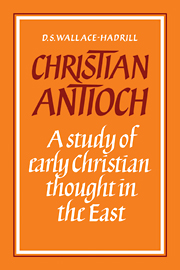Book contents
- Frontmatter
- Contents
- Foreword
- Abbreviations
- Introduction: survey of the history of Antioch
- 1 The religious background to Antiochene Christianity: pagan, Jewish, gnostic
- 2 The interpretation of the biblical record
- 3 Historiography in the Eastern Church
- 4 The doctrine of the nature of God
- 5 The use of Greek philosophy by the Eastern Church
- 6 The human experience of Christ and the salvation of man
- 7 Antiochene theology and the religious life
- Appendix 1 Eastern representation at Nicaea
- Appendix 2 The feminine element in Syrian Christianity
- Notes
- Bibliography
- Index
6 - The human experience of Christ and the salvation of man
Published online by Cambridge University Press: 03 May 2010
- Frontmatter
- Contents
- Foreword
- Abbreviations
- Introduction: survey of the history of Antioch
- 1 The religious background to Antiochene Christianity: pagan, Jewish, gnostic
- 2 The interpretation of the biblical record
- 3 Historiography in the Eastern Church
- 4 The doctrine of the nature of God
- 5 The use of Greek philosophy by the Eastern Church
- 6 The human experience of Christ and the salvation of man
- 7 Antiochene theology and the religious life
- Appendix 1 Eastern representation at Nicaea
- Appendix 2 The feminine element in Syrian Christianity
- Notes
- Bibliography
- Index
Summary
The golden age of Antiochene theology lies in the century between the birth of Diodore of Tarsus in about 330 and the death of Theodoret in about 458, the period in which it attained its most complete articulation and during which in particular it developed its christology. During this period we find Diodore, widely held to be the father of Antiochene christology; Theodore, its most systematic and most extreme exponent; Nestorius, its most notorious and its most hated advocate; Chrysostom, its most moderate adherent and the one whose work was best known in the west; Theodoret, its historian; Hībā (Ibas), instrumental in facilitating its dissemination in the east; a formidable company of witnesses. Diodore's claim to paternity needs to be qualified in the important respect that the Antiochene tradition was already in existence in embryo well before his birth. The fourth century received the Antiochene formulation of the doctrine of Christ's nature rough-hewn from its predecessors and shaped it with greater precision.
Before the full formulation of the tradition we find Ignatius of Antioch in the early second century already expressing with great force his opposition to gnostic docetism concerning the reality of Christ's human nature and of his human experience. The letters of Ignatius are not documents in which one would expect to find carefully-articulated statements of doctrine, since they are the work of a man being led to his death, written in haste in a mood of exultation at his imminent martyrdom.
- Type
- Chapter
- Information
- Christian AntiochA Study of Early Christian Thought in the East, pp. 117 - 150Publisher: Cambridge University PressPrint publication year: 1982

